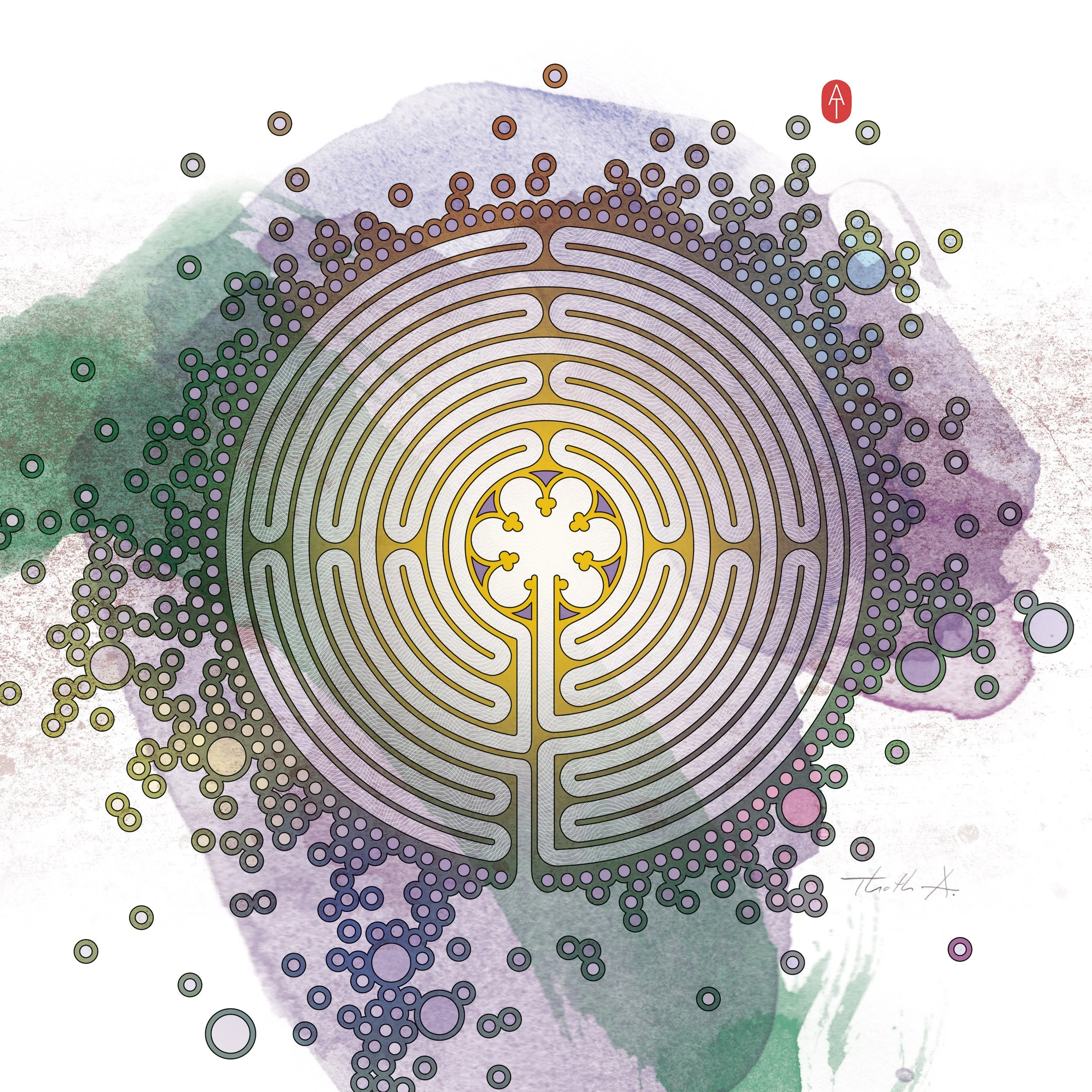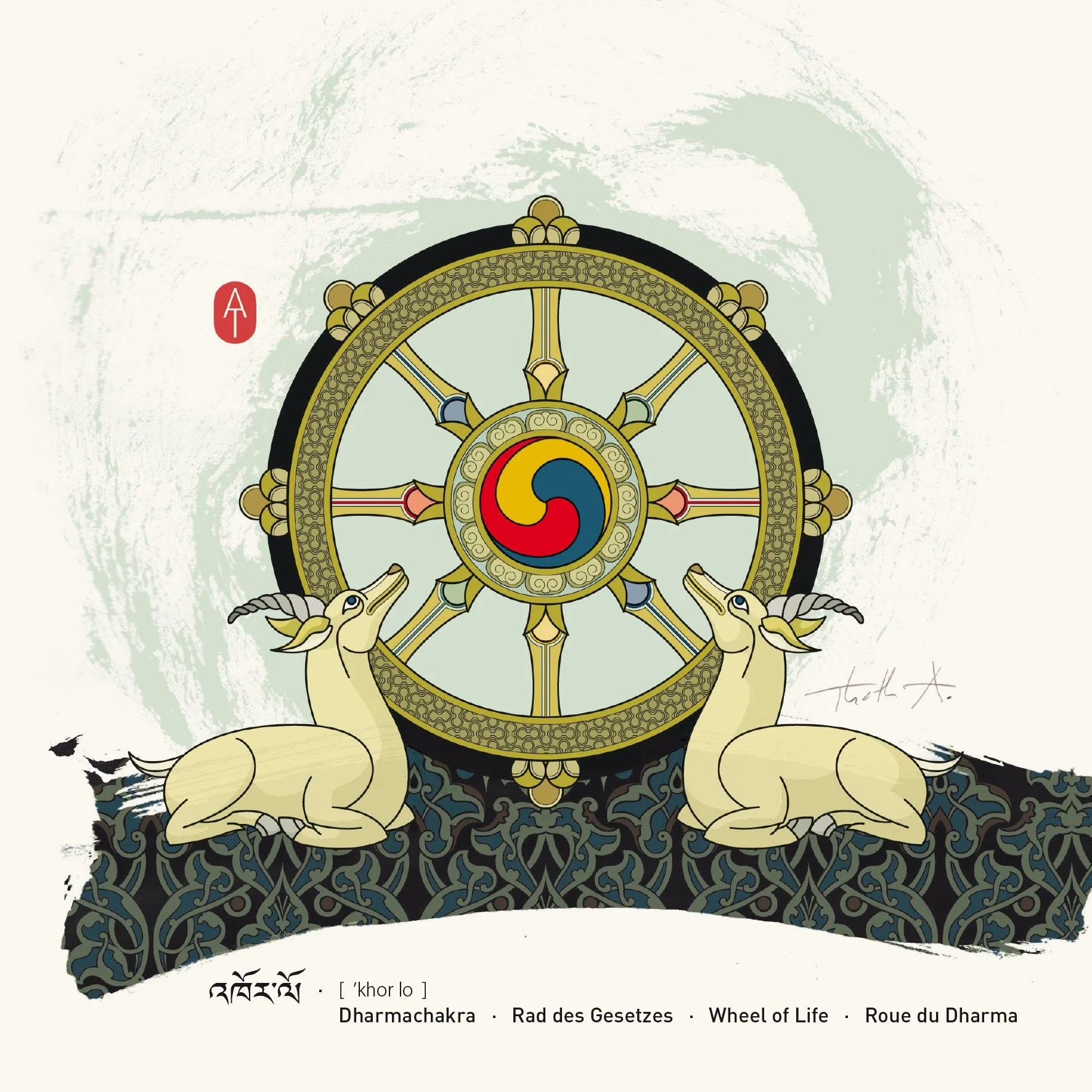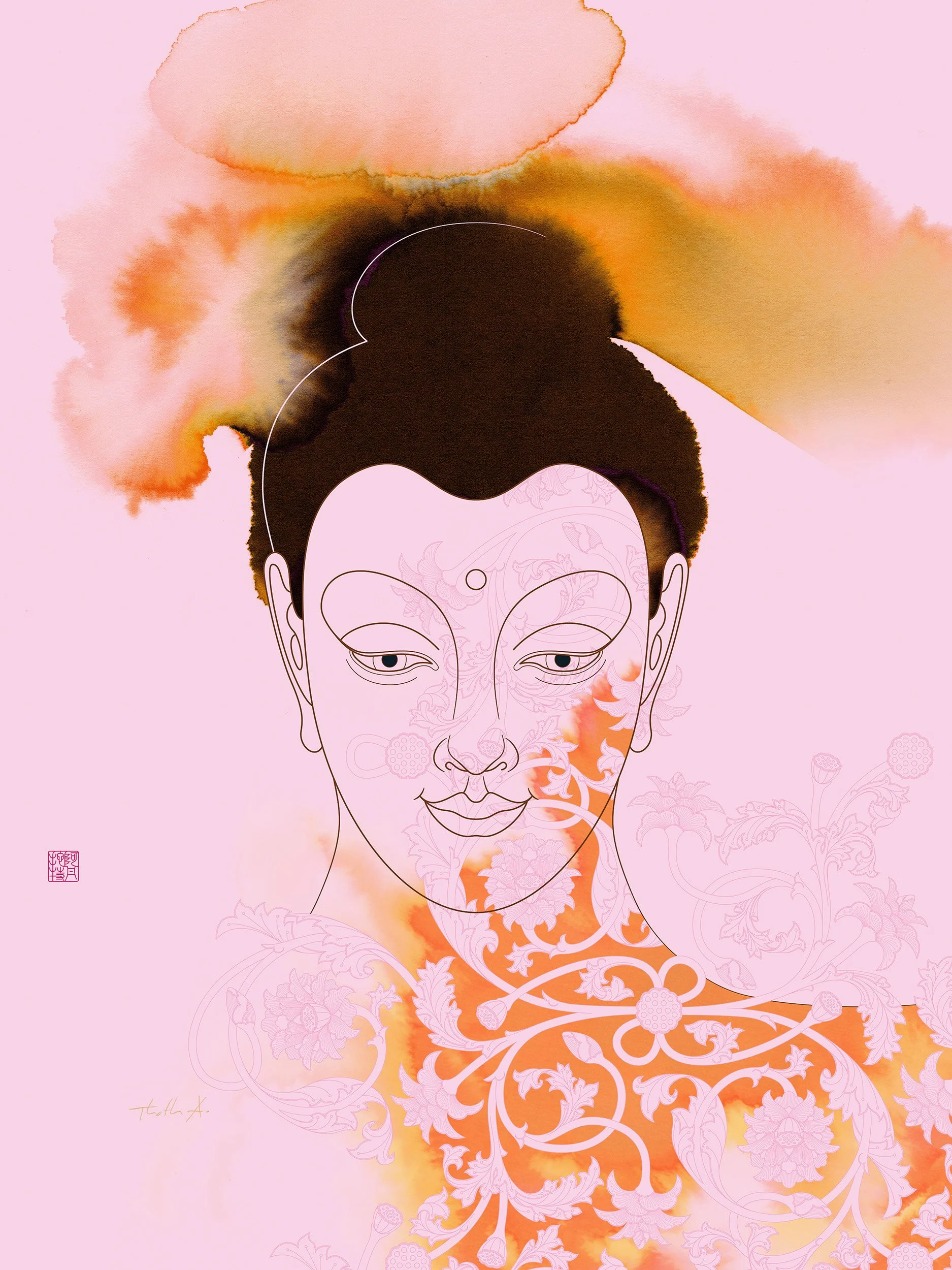It’s all about being centered, literally.
The eight trigrams form a circle with eight directions – to the center no trigram is assigned. This area rather functions as a connecting structure or the core of the whole Lo Shu square. In place of a trigram usually the character Tao or the Tajitu (Yin and Yang symbol) is assigned to this quadrant. Dào, so the Chinese phonetics, means path and stands for absolute wholeness and for the unity of the five elements. The center of this Taoist cosmology is embodied by the yellow dragon of the center.
Bagua Map (Lo Shu Square)
The middle of your living space stands analogously also for the center of your own self. This bagua zone symbolizes the heart and the soul of the existence. In this place all the threads come together. In your body, at the base of the spine lies a convoluted serpent, the Kundalini, ready to rise and supply all the chakras (energy centers) of your body with energy – on its way up to the crown chakra and spiritual enlightenment. This comparison is highly simplified, but it represents pretty accurately the function of the central, fifth bagua. But the fifth bagua is not only related to the subtle or the transcendence, it rather shows the integration of spirituality into the material (real) life: the wholeness. After all, this area is governed by the element earth and relatet to spirituality and wholeness!
The image of the serpent could hardly be more appropriate to embody this bagua: Many creation myths, transformation rites and spiritual practices are connected with snakes, usually equated with the cosmic energy of preexistence.
Attention: First care about the basic energy and structure of your Bagua zones. The qi must flow freely before you can start planing measures for individual life areas. Install one Feng Shui vehicle or symbol after the other and give it some time to unfold its impact before going on to the next stage.
Where do you stand?
The feng shui bagua center of the house is a strong energy vortex with activity that can be compared to a human’s heart.
The image of the serpent and the Kundalini shows precisely how the element earth relates to the spiritual theme of this life area. One has to be grounded, nourished, protected and centered to become whole. Talking about spirituality, we often think about something lifted, ethereal, coming from above – but it’s the other way round! Grounded in our believes and practices, spirituality grows like a tree, slowly reaching higher spheres. It has a lot to do with our weltanschauung, our self-image and real experiences – with where we feel home and centered.
It's
all
about
Earth
—
Easy Earth Element Decorating Tips:
The energy of the element earth pushes in the width and represents the changing of the seasons. To strengthen this energy and the central force you can decorate with yellow, ocher, brown and natural shades combined with square shapes. The element earth is nourished by fire, so you can complement your look using red, pink, orange, triangular shapes and some fire representatives such as lamps, candles, light and incense stick. But don’t exaggerate – you don’t want to leave scorched earth behind, do you?
Crystals are excellent representatives for the earth element, or use a Himalayan salt lamp; numerous health benefits come from using a salt rock lamp (when heated, salt rock becomes a natural air ionizer).
Erde | 土 | Tu, Giclée Print
Those of you wishing more meaning, wholeness and wisdom in your life, should pay special attention to this life area. Maybe build a small house altar? You can use everything that inspires you and helps you to get a better access to your spirituality, your religion or your believes.
Of course, we need all 5 elements for our well being — in different proportions for different spaces and different people — but living in a material world the earth element is kind of basic and fundamental. A strong Earth element in your space will bring you back to your own center, calm and reassure you, as well as provide a save and sacred place for your spirituality.
Bagua Area N°5, Giclée Print
There are numerous symbols related to spirituality and wholeness. I would go as far as to say that the majority of symbols in the world are related to this core theme in one way or the other. So it’s important to watch out for the right ones for you. Look for symbols that represent your personal views and that respect your religion (if you are a believer). This is the place for religious cult objects, images of saints and memorabilia; any kind of mandala works well too.
Some More Tips, Charms And Ideas:
Energizing this life area you should watch out for a solid, nurtured and contemplative energy and a bright, clear and peaceful atmosphere!
If you prefer a ‘non-religious’ kind of decoration, use some art with a strong Earth element energy instead, such as images with landscapes (mountains, deserts, etc.) or an earthen bowl for example.
Often enough small things can make great impact. Placing a yin and yang symbol in the middle of your home may just give the necessary boost to feel centered and balanced. A crucifix works just as fine – besides its religious context it symbolizes matter and world’s center (like any other cross with two bars which intersect one another at right angles).
How do you feel about a square rug (textiles represent Earth) in a beautiful ocher yellow to stabilize your center? Or paint the center of your apartment in some natural or yellow tones and light a candle!
Things To Avoid:
No clutter! Well, disorder won’t do you any good somewhere els either, but please avoid it in the middle of your home. As mentioned before, the center Bagua functions like a heart, and a cluttered heart will inevitably lead to a heart attack or other kinds of malfunctions.
Popular Symbols For This Area:
It’s always good to find personal, symbolic pictures or objects to decorate and boost a specific life area. Your own, positive relation to the piece/symbol can be very helpful! On the other hand, you have to keep in mind, that the cycle of the five phases retains its validity and that also personal symbols have to support the basic concept of the area.
Browsing the web you will literally find tons of Feng Shui charms and symbols for your purpose, in any size, style and quality. The following examples from my catalogue do fit well to the spirituality and wholeness area as well.
Labyrinth
A labyrinth (maze) is a system of winding lines or ways with numerous changes in directions. The pattern becomes a riddle which nevertheless leads to the target destination, the center. This construction symbolizes our path of life with all its trials and tribulations – and the center represents the desired aim. The labyrinth also embodies our spiritual and psychic journey in search of self-knowledge and wisdom.
One of the most famous labyrinths can be found in the Chartres Cathedral, strictly speaking it is a marble mosaic one the cathedral floor where pilgrims can follow the maze while praying.
Labyrinths exert a particular fascination on people. Instinctively everybody tries to find the „right“ way. This is why the symbol is so popular and its representations are so manifold. Nevertheless the most common constructions are round, geometric and symmetric. The symbolism of the labyrinth is kind of an addition to the topic of the circle and has similarities to the meaning of the spiral.
Labyrinth, Purchase prints via Society6
Wheel / Chakra
A wheel is formally seen a circle with spokes and a central hub – it is also symbolically closely related to the circle and stands for the eternal cycle of growing and passing (Samsara). In Buddhism and Hinduism the wheel (chakra) is used primarily as a spiritual symbol, mostly in the form of the Dharmachakra or the Kalachakra.
Dharmachakra, Art Card, Out of stock
The Dharmachakra (wheel of life / wheel of law) symbolizes Buddha’s teaching and is one of the eight auspicious, Buddhist symbols (Ashtamangala). In the Himalayan region, the wheel of life is traditionally accompanied by two deers (Indian gazelles). This form of presentation is intended to remind the viewer on Buddha’s first sermon in the deer park of Sarnath.
Kalachakra, Giclée Print
The Kalachakra Mandala (wheel of time) shows and explains the cosmos in the form of a palace surrounded by a cosmic flame circuit, protection rings, lotus leaves, various forecourt, instruction chambers, guarded gates, several interior courtyards and finally the central shrine.
The term Kalachakra refers simultaneously to the practice of meditation, the mandala serving as a tool for this practice, the inauguration ceremony and to the Tantric deity which underlies the practice. It is considered the highest and at the same time most complex ritual of Tibetan Buddhism. The related, Tantric meditation practices are accelerating the development of the practitioners on his way to enlightenment.
In simplified terms, the Kalachakra ritual wants to bring the individual powers of the microcosm and the macrocosm back together in harmony.
Buddha
Gautama Buddha, also known as Buddha Shakyamuni, Siddhartha Gautama (real name) or simply Buddha is a historic (600 BC), ascetic sage, on whose teachings Buddhism was founded.
Born as the crown prince of Shakya Kingdom, Gautama was living a very privileged and sheltered life until the age of 29, when he learned of the deep suffering experienced in life by people. Deeply moved he left his palace life and family in order to find the causes of this suffering and the means to overcome it.
After about six years of study, self-deprivation, and deep meditation he finally realized his goal. He had become an enlightened one (a Buddha).
Today he is revered globally, also by non-Buddhist, as a symbol for enlightenment and the possibility, that there is a way to liberation open to everybody.
Gautama Buddha, Purchase prints via Redbubble
Yellow Dragon of the Center
The yellow dragon of the center is one of the five heavenly beasts (constellation), one of the fundamental symbols in Taoist cosmolgy and the five element theory. Among all the different, Chinese dragons he plays the first fiddle in the Taoist cosmology and represents the element earth, the color yellow, heaven and the sun.
Yellow Dragon Of The Center, Giclée Print
Note! Using suitable Feng Shui charms and symbols can harmonize and strengthen Bagua life areas, but can’t replace a energetic Feng Shui consultant, of course. For more complex and individual solutions it’s always worth to invest in a pro!
Curious about other Bagua life areas?
> Career and Life Journey (1)
> Love and Relationships (2)
> Health and Family (3)
> Wealth and Prosperity (4)
> Helpful Friends and Travel (6)
> Creativity and Children (7)
> Knowledge and Wisdom (8)
> Fame and Recognition (9)








